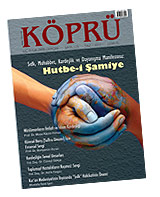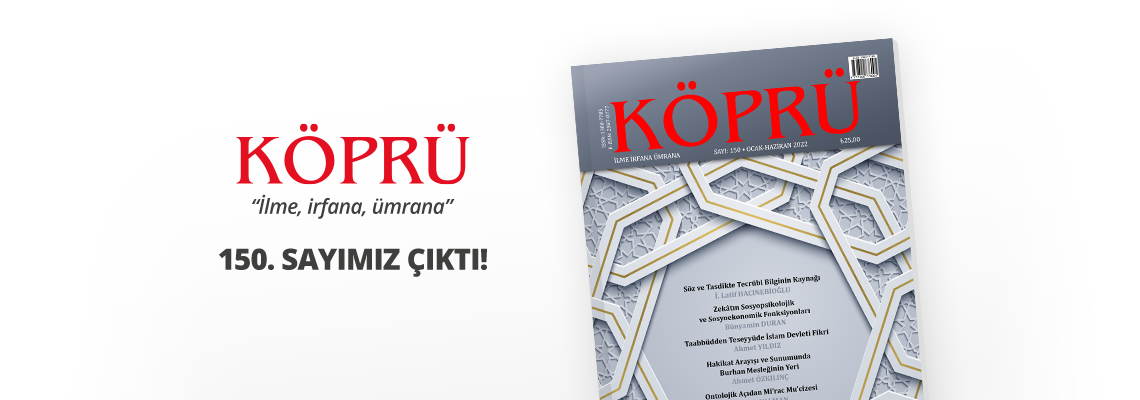Köprü Anasayfa

Sıdk, Muhabbet, Kardeşlik ve Dayanışma Manifestosu: Hutbe-i Şamiye
"Yaz 2011" 115. Sayı
-
The Manifesto of Accuarcy, Love, Broherhood, and Solidarity: Hutbe-i Şamiye
Editorial
Hutbe-i Şamiye possesses the properties of a map seeking and showing the ways of the revival of Islamic societies which loose power, are left backwards vis-à-vis the West, and display their weaknesses through the “hopelessness” they have. To propose this work, which can also be described as a manifesto on the process of the revival of Islamic civilization, into the agenda of the Muslims, we gave place in our previous issue to the texts of the conference “Said Nursi’s Project of Islamic World: Hutbe-i Şamiye” held in Damascus by the Risale-i Nur Institute last March. In this issue, we keep on discussing the ideas in Hutbe-i Şamiye.
As a work drawing attention to the basic problems of the Islamic world and their ways of solution, Hutbe-i Şamiye analyzes the miserable situation of the Islamic societies from a number of aspects, diagnoses the illnesses which are accepted as the reasons of decline, and indicates the paths of treatment.
Said Nursi, who evaluates the weakening and decline of the Islamic world with respect to the West and goes beyond the classical approaches via separating himself from the thinkers who tried to take precautions regarding this issue, grounds his ideas through getting rid of the modernist constraints. Nursi, first of all, gets to the bottom of the diseases which left the Muslims in the darkness of the middle ages, and then he shows the ways of remedy via utilizing the pharmacy of Quran. This treatment method also offers the clues for a global peace which, starting from the Islamic societies, will cover all humankind.
Our writers, who discussed the illnesses of hopelessness, death of accuracy, loving enmity, being unfamiliar with the luminous ties connecting the believers to each other, despotism, and individualism in our previous issue, continue to talk about the ideas which will make Islamic societies advance and contribute to global peace, especially around the concepts of accuracy, love, and brotherhood in this issue. From this point of view, Hutbe-i Şamiye’s characteristic as being the manifesto of accuracy, love, brotherhood and solidarity comes into prominence.
***
While Bünyamin Duran tries to ground the importance of universal love for reaching global peace departing from the works of Bediüzzaman Said Nursi; Atilla Yargıcı deals with the thesis that possessing love for human beings is the recipe of societal diseases, and assesses this thesis from Risale-i Nur’s perspective. Sebahattin Yaşar, who, from a similar point of view, states that love is a formula which can solve the problems of not only the Islamic world, but also all humankind, mentions with examples that Said Nursi is suggesting a social treatment method which starts from the inner world of the person to confront the social diseases. Developing a critical approach to the modern perception of entity via a deeper analysis, Hakan Yalman emphasizes that a proper explanation of the being should contain the truth of nur-u Muhammedi (pbuh), and makes clear that the truth of “things” is love through an integrated ontological approach.
Cüneyt Gökçe, who examines brotherhood as one of the basic concepts mentioned in Hutbe-i Şamiye, emphasizes that the brotherhood of Islam is a connection of brotherhood, which totally depends on religious grounds, ties the hearts to each other via the bond of faith and derives from the principle of taqwa; and then he states the basic elements of the brotherhood of Islam. Musa Kazım Yılmaz, on the other hand, puts weight on the ways to overcome the problems of weaknesses in the brotherhood of faith, and draws attention to the concepts of agreement and sincerity.
Mustafa Said İşeri deals with the concept of accuracy in a broader view and points out that the spirit of the civilization of Quran, which bases on the principles of right, justice, virtue, assistance, hüda and brotherhood, is consisted of “accuracy.” Our writer studies in his work the truth of accuracy on the path to the revival of the civilization of Quran, and shows the characteristics of Risale-i Nur’s accurate disciples.
Nimet Demir’s article discusses the relationship among “individualism, counseling, and patriotism” departing from the sixth illness in Hutbe-i Şamiye which is described as “devotion of help to personal benefit.” The comprehensive work produced by Mustafa Akça deals with two of the theses in Said Nursi’s Hutbe-i Şamiye. One of them argues that, as the point of “progress” is concerned, Muslims should get rid of the present modernist structure and Europe which produces this structure. And secondly, explanations are made regarding the six illnesses mentioned in Hutbe-i Şamiye.
***
We witness a time period in which the good news given by Bediüzzaman a hundred years ago are being realized one by one. We hold a certain belief that the seeds of “hope” which were put under the soil by Hutbe-i Şamiye will flourish in the Islamic world, the climate of accuracy, love and brotherhood will cover all personalities, and an understanding of freedom which is adorned by right, justice, and virtue will spread. As we leave you with our issue, we hope to meet again in our next issue with the dossier of “Münazarat”.
-
Sıdk, Muhabbet, Kardeşlik ve Dayanışma Manifestosu: Hutbe-i Şamiye
Editör
Yazıyı okumak için tıklayınız... -
The Manifesto of Accuarcy, Love, Broherhood, and Solidarity: Hutbe-i Şamiye
Editorial
Yazıyı okumak için tıklayınız... -
Küresel Barış (Sulh-u Umumi) İçin Evrensel Sevgi -Risale-i Nur’a dayalı bir psiko-analiz-
Bünyamin DURAN
Yazıyı okumak için tıklayınız... -
Toplumsal Hastalıkların Reçetesi: Sevgi
Atilla YARGICI
Yazıyı okumak için tıklayınız... -
Hutbe-i Şamiye: “Said Nursi ve Davranışı”
Mustafa AKCA
Yazıyı okumak için tıklayınız... -
Kur’an Medeniyetinin İhyasında “Sıdk” Hakikatinin Önemi ve Risale-i Nur’un “Sıddîk” Talebeleri
Mustafa Said İŞERİ
Yazıyı okumak için tıklayınız... -
Müslümanların İhtilafı ve İslam Kardeşliği
Musa Kazım YILMAZ
Yazıyı okumak için tıklayınız... -
Sosyal Problemlerin Çözümünde “Muhabbet”in Etkisi
Sebahattin YAŞAR
Yazıyı okumak için tıklayınız... -
Kardeşliğin Temel Unsurları
Cüneyt GÖKÇE
Yazıyı okumak için tıklayınız... -
Risale-i Nur’da Muhabbetin Ontolojik Temelleri
Hakan YALMAN
Yazıyı okumak için tıklayınız... -
Ferdiyet, Meşveret ve Hamiyet
Nimet DEMİR
Yazıyı okumak için tıklayınız... -
Risale-Nur’a Göre Hakikat-i Hamiyet
Yakup ASLAN
Yazıyı okumak için tıklayınız... -
Bediüzzaman Said Nursi ve Risale-i Nur Kitaplar Bibliyografyası
İsmail ÇAKMAK
Yazıyı okumak için tıklayınız...
